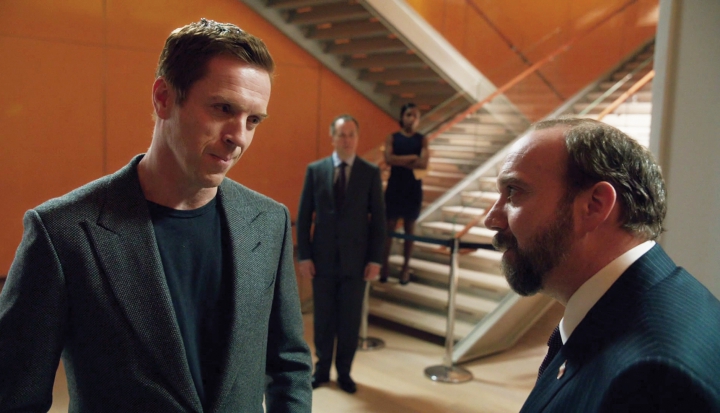The statute of limitations has long since expired on the crimes that caused the global economic collapse of 2008, and there never was any public accounting. Taxpayers saved the system, and the people who wrecked it to enrich themselves mostly kept their money and their power. In fact, a University of California, Berkeley study in 2013 showed that 95 percent of the income gains since 2009 had gone to the top 1 percent of the population.
Such an unhealed and untended historical wound never just goes away. The pain will find expression, perhaps constructively, in a movement for radical reform that could emerge from the Bernie Sanders campaign or in the self-destructive xenophobia that Donald Trump exploits. But, in the end, we will probably be left to deal with this historic trauma in the same way we dealt with the Cold War, the end of the frontier, and the shame of slavery—the fun house mirror of our popular culture.
During the past eight years, some of America’s braver and better journalists and artists did their best to expose the truth about what Wall Street did to America in the early years of this century. The Big Short, both the Michael Lewis book (2010) and the 2015 Oscar-winning film, dramatized the greed and venality that ruled the world of finance through the eyes of a few oddball traders who saw the crash coming.
Michael Moore’s 2009 film Capitalism: A Love Story combined his patented slash-and-burn job on the titans of greed with an insightful take on the way debt (mortgage, credit card, student loan, etc.) makes Americans afraid to challenge the system. Charles Ferguson’s 2010 documentary Inside Job went after the same villains as Moore—but with a somber tone and better footnoting—and won the Oscar for Best Documentary. Even Bruce Springsteen’s stirring 2012 album, Wrecking Ball, contained songs such as “Death to My Hometown” and “Jack of All Trades” that could teach us more about the functioning of our economy than we ever learned in school.
However, most of those cultural artifacts required of their audiences some degree of critical thinking and focused attention. So the Showtime premium cable series Billions is probably the version of the Wall Street legend that will stick. The series tells the story of a running cat-and-mouse battle between a U.S. Attorney, Chuck Rhoades (played by Paul Giamatti), and a double-dealing hedge fund billionaire, Bobby Axelrod (Damian Lewis).
Billions debuted in January with a veneer of quasi-documentary credibility due to the participation of co-creator and executive producer Andrew Ross Sorkin, the New York Times financial columnist who wrote Too Big to Fail, an exhaustive insider’s chronicle of the crash and subsequent bailout. However, the show is unfolding as a fairly conventional serial melodrama in the mode of Empire or Scandal, though with the de rigueur premium cable doses of nudity and pervasive F-bombs.
Sorkin’s familiarity with the world of Wall Street does show in the dense, jargon-laden, rapid-fire dialogue that ricochets about the show’s two professional settings: the trading floor and the prosecutor’s office. But some other more substantial points just don’t ring true.
At the heart of the plot, we’re supposed to believe that a U.S. Attorney (Rhoades) would personally lead an investigation into a Wall Street company where his own wife is on staff, at a seven-figure salary, as a sort of motivational life coach to the traders.
Then there’s the fact that the show’s Axelrod seems to be the only 21st-century hedge fund honcho in New York who has always trafficked solely in the stock of “real economy” companies and never touched the world of mortgage-backed securities and other more exotic “derivatives”—the stuff that brought down the global economy and still looms large in American finance.
Maybe the Billions creators made this choice because they thought derivatives would be too hard to explain to a TV audience, although Margot Robbie and Selena Gomez did a pretty good job of it in The Big Short. More likely the opposite is true. Maybe Americans now know enough about the perverse criminality of the derivatives market that association with it would make Axelrod a less sympathetic figure.
So far, the viewer is sorely tempted to root for the capitalist ogre, Axelrod, and against the purported representative of the people, Rhoades. For one thing, Axelrod is better looking and a lot more fun than his pudgy, conniving adversary. He’s a guy from a blue-collar family who worked his way up from nothing. Rhoades is the fortunate son of an old Wall Street Brahmin. Axelrod was the only member of his firm to survive 9/11, and he has paid for the education of all the children of his deceased colleagues. Meanwhile, Rhoades’ thirst for justice sometimes seems only a by-product of his lust for higher office. Axelrod is married to a former nurse, and they seem to have a healthy and monogamous sexual relationship. Rhoades, however, comes home at night whimpering for bondage and discipline from his psychiatrist wife.
Andrew Ross Sorkin’s cozy relationship with his Wall Street sources has sometimes raised questions about his journalism, even among some of his colleagues at the Times. It’s worth noting, for instance, that back when Too Big to Fail was published, two of the biggest CEO villains of the crash-and-bail era, Jamie Dimon of JPMorgan Chase and John Mack of Morgan Stanley, showed up at his book launch party. It seems that Dimon and Mack, and their successors, will have even less to fear from Sorkin’s foray into scripted TV than they did from his book.
This article appears in the May 2016 issue of U.S. Catholic (Vol. 81, No. 5, pages 38–39).
Image: Courtesy of Showtime













Add comment